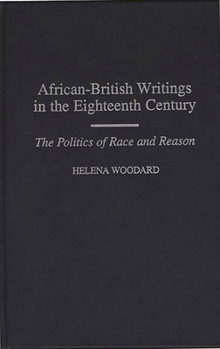African-British Writings in the Eighteenth Century: The Politics of Race and Reason
The eighteenth century was a time of great cultural change in Britain. It was a period marked by expeditions to the New World, Africa, and the Orient, and these voyages were reflected in the travel literature of the era. It was also a period in which seventeenth-century empiricism and the scientific method became dominant, and in which society became increasingly secular. Fundamental to the eighteenth-century worldview was the notion of the Great Chain of Being, in which all creatures and their Creator stood in a hierarchical relationship with one another. The years from 1660 to 1833 witnessed both Britain's participation in slavery and the appropriation of the Great Chain of Being by social anthropologists and political leaders. With the rise of the slave trade, blacks were brought to Britain against their will, where they were enslaved. At the same time, intellectuals of the period tried to place these slaves within the hierarchical frame provided by the Great Chain of Being.
The presence of slavery in Britain aroused much debate among blacks and whites alike, and the literature of the eighteenth century reflects that debate. This book examines representations of blacks in eighteenth-century British literature to illuminate the discussions about race during that period. The volume begins with a discussion of Alexander Pope's popularization of the Great Chain of Being in his Essay on Man, which argued the universal ranking of humanity and which provided an intellectual foundation for slavery. It then examines the works of several white canonical writers, including Defoe, Addison and Steele, Swift, and Sterne, to see how blacks are portrayed in their works. The volume also examines works by African-British writers, such as James Albert Ukawsaw Gronniosaw and Quobna Ottobah Cugoano, who expose exclusionary practices among some theologians; Ignatius Sancho, whose Letters show how slaves were taught to be grateful, and how those lacking gratitude were considered inhuman; and Olaudah Equiano, who shows how racial hierarchies function as a literary trope, particularly in travel literature. The final chapter, on The History of Mary Prince, examines the interaction of race and gender.




